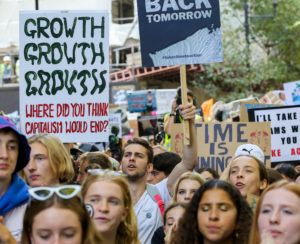This week’s long read pick is ‘Growing pains: the myth of boundless growth’ from Ian Christie and others at the Centre for Understanding Sustainable Prosperity. First published by Open Democracy, it looks at the implications for our world economy of a future seeking either to prioritise growth or decarbonisation.
 There is no consensus in environmentalist circles at present about whether it is possible to separate economic growth from rising carbon emissions, whether a ‘relative decoupling’ – already taking place – in which the rate of emissions growth gradually slows as processes and systems become more efficient, or absolute decoupling, defined as the total separation of carbon emissions from economic growth. The authors of this blog argue that the latter is a pipe dream:
There is no consensus in environmentalist circles at present about whether it is possible to separate economic growth from rising carbon emissions, whether a ‘relative decoupling’ – already taking place – in which the rate of emissions growth gradually slows as processes and systems become more efficient, or absolute decoupling, defined as the total separation of carbon emissions from economic growth. The authors of this blog argue that the latter is a pipe dream:
“The claim and insistence that absolute decoupling can be done are little more than a quasi-religious belief in economic growth as the fundamental precondition of hope in a secularised immanent worldview.”
Rather, they suggest we should focus on ‘degrowth’ — that is to say, on bringing about a society that no longer places primacy on a fantasy of perpetual growth that is already, they argue, delivering diminishing returns in wellbeing terms as well as causing irreversible environmental harm:
In a post-growth economy, innovation will continue. But it will be a different kind of innovation. Instead of innovation that aims to deliver yet another new iPhone, we need social and institutional innovation that enables us to live better, happier lives. […] In other words, the potential winnings from the degrowth bet is a society focused on providing things that make life worth living, beyond new consumer goods. More time with your family, more creative work, a more equitable distribution of income. And it aims to provide these without undermining the ecological systems that enable us to live in the first place.- CUSP
The work coming out of CUSP articulates many of the themes currently emanating (somewhat more stridently) from Extinction Rebellion and Greta Thunberg’s school strike, and characterised recently on this website as ‘hippie conservatism’ — a call for us to turn away from destructive ‘materialism’ toward ‘things that make life worth living’. Religious and socially conservative voices have been nigh-on alone for some time in arguing that some things matter more than money. It is striking to see a Left-leaning, pro-EU, environmentalist corner of academic economics echoing the same refrain, and to begin considering what those ‘things that make life worth living’ might actually be.








Join the discussion
Join like minded readers that support our journalism by becoming a paid subscriber
To join the discussion in the comments, become a paid subscriber.
Join like minded readers that support our journalism, read unlimited articles and enjoy other subscriber-only benefits.
Subscribe